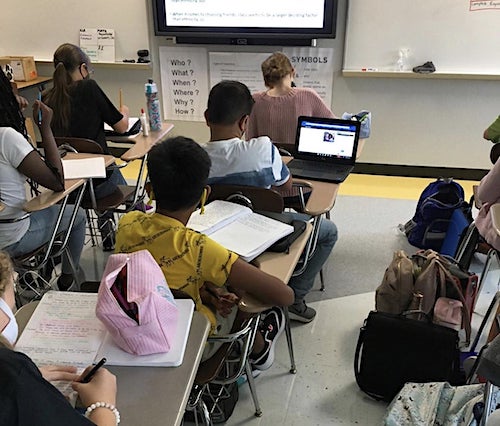
After a large majority of Georgians surveyed supported a proposal to make high-stakes standardized tests essentially meaningless for public school students this year, the State Board of Education voted Thursday to withdraw its recommendation to count the end-of-year exams as 10% of a course grade.
Georgia School Superintendent Richard Woods pushed to drop the test’s effect to .01%. State law now says the test should count for 20% of the final grade for some high school classes.
In addition to Woods, many teachers, parents, and students hoped to avoid the high-stakes, end-of-year tests as the uncertainty of a pandemic continues to upend the usual order of the school year.
Last month, the school board voted to reject Woods’ proposal to give tests like the Georgia Milestones nearly zero weight and instead give it a 10% effect on course credit. That vote was nonbinding. If the board votes to approve the .01% weight in December, districts may recalculate course grades for students who have already tested.
“I appreciate the State Board of Education hearing and responding to the clear will of the people on this issue, and hope that will continue with a vote to approve the .01% recommendation in December,” Woods said in a statement after the board vote.
“My position on this has not changed: it is logistically, pedagogically, and morally unreasonable to administer high-stakes standardized tests in the middle of a pandemic. If the federal government is going to continue insisting on the administration of these exams, it is incumbent on us at the state level to ensure they are not high-stakes and do not penalize students and teachers for circumstances beyond their control.”
In a public comment survey open from Oct. 2 to Nov. 17, Georgians selected their preferred course weight for this school year, either keeping the existing 20%, going with the board’s preferred 10%, or the superintendent’s recommended .01%. A total of 93,079 people responded, with 86.31% saying the weight should be .01%, 11.35% saying it should be 10%, and 2.34% saying it should be 20%.
Woods called for the test to count for nearly nothing after U.S. Education Secretary Betsy DeVos said she would not approve states’ waivers to cancel the test this school year. Georgia was one of the first states to apply for and receive a waiver when they were available last spring after Gov. Brian Kemp ordered school buildings shut to prevent the spread of COVID-19.
Board members who argued last month against reducing the tests to a near meaningless role said the loss of year-over-year comparable data could harm students and teachers.
Test scores should not factor into whether a student advances to the next year or count against a teacher’s evaluations this year, said board member Mike Royal, but reducing their importance to nothing would undo a lot of hard work from educators.
“I’m not ready to give up on this year, I’m not ready to give up on this semester,” he said. “They are teaching and learning, and what about the districts that busted their butt all summer planning, preparing to get these kids back to school and have done a fantastic job, who wants that data?”
Making the test functionally optional would also disproportionately harm children in poverty or in other challenging situations, he said.
This article appears in partnership with Georgia Recorder







